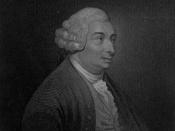Has Popper Provided a Satisfactory Answer to the Problems Identified by Hume?
Introduction
In this essay, I will answer the above question, talking about Hume's views on induction and empiricism and whether or not Popper answered Hume's problems. I will start buy talking about both philosophers, then comparing them in a conclusion.
David Hume
David Hume was born in Edinburgh in 1711, he spent most of his childhood in Ninewells, his family's home on the Whitadder River in the lowlands near Berwick. At the age of twelve, David joined his older brother at Edinburgh University, where he studied mathematics and contemporary science. He also read history, literature, and ancient and modern philosophy. He became extremely interested in philosophy, and especially French philosophers, so he moved to France, to La Flèche, in Anjou, known for its Jesuit College. In the country of which Descartes studied almost a century beforehand, he concentrated on French and continental literature, including such authors as Malebranche, Dubos, and Bayle.
And between 1734 and 1737, he wrote his first book A Treatise of Human Nature. In his lifetime, Hume traveled considerably between the continent and Great Britain, and met such people as Jean-Jacques Rousseau. When Hume discovered that he had intestinal cancer, he prepared for his death with the same peacefulness that he had lived his life. Before he died in 1776, he left his last book, Dialogues concerning Natural Religion, with his nephew to make sure it was published.
Hume, atheist and empiricist, criticised theological arguments about the existence of God. An empiricist is someone who believes in empiricism, which is defined as a "philosophical belief that all knowledge is derived from the experience". But unlike other empiricists, he was able to distinguish the flaw in the theory on Induction. So, out of Hume's interpretation...


